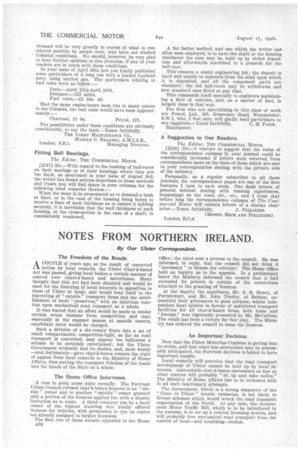NOTES FROM NORTHERN IRELAND.
Page 22

If you've noticed an error in this article please click here to report it so we can fix it.
. By Our Ulster Correspondent.
The Freedom of the Roads.
ACOUPLE of years ago, as the result of concerted action by local councils, the Ulster Char-k-bancs Act was passed, giving local bodies a certain amount of control over chars-Zt-bancs and motorbuses. Many thought that this Act had been obtained and would be used for the fostering of local interests in opposition to those of Ulster at large, and would lend itself to the boycotting of " outside " transport firms and the establishment of local "preserves," with an injurious reaction upon mechanical road transport as a whole.
It was feared that an effort would be made to render certain areas immune from competition and that, especially in the summer season at seaside resorts, exorbitant rates would be charged.
Such a division of a six-county State into a set of small compartments, competition-tight, so far as road transport is concerned, may appear too ludicrous a scheme to be seriously entertained; but the Ulster Government evidently had its doubts, and, most wisely —and fortunately—gave char2a-bancs owners the right of appeal from local councils to the Ministry of Home Affairs, thus putting the transport freedom of the roads into the hands of the State as a whole.
The Home Office Intervenes.
'A ease in point arose quite recently. The Portrush Urban Council refused char-lt-bancs licences to an "outside" owner and to another "outside-" owner granted only a portion of the licences applied for, with a drastic limitation as to route. A third company run by a local owner of the highest standing was kindly offered licences for vehicles, with permission to run on routes not already assigned to luckier licensees.
• The first two of these owners appealed to the Home B38 Office ; the third sent a protest to the council. He was informed, in reply, that the council did not think it " necessary " to license his vehicles! The Home Office held an inquiry as to the appeals. In a preliminary letter the Ministry informed the council that it had exceeded itS powers in certain of the restrictions attached to the granting of licences.
At the inquiry the appellants, Mr. S. R. Henry, of Portstewart, and Mr. John Tinsley, of Belfast, expounded their grievances to good purpose, whilst independent local opinion in favour of unfettered transport facilities for all char-h-bancs firms, both home and "foreign," was vigorously presented by Mr. McCallum. The result has been a victory for fair play. The Ministry has ordered the council to issue the licences.
An Important Decision.
Now that the Ulster Motorbus Combine is getting into its stride, and that other bus enterprises may be reasonably anticipated, the Portrush decision is bound to have important results.
Local councils will perceive that the road transport development of Ulster cannot be held up hy local interests. Anti-outside char-a-banes movements on foot at other centres will probably "sit up and take notice." The Ministry of Home Affairs has to be reckoned with in all such reactionary attempts.
The Government, which is a strong supporter of the " Come to Ulster" tourist campaign, is not likely to favour schemes which would wreck the road transport organization of the North. At any rate, the Government Motor Traffic Bill, which is to be introduced in the autumn, is to set up a central licensing system, and will probably free mechanical road transport from the control of local—and localizing—bodies.




























